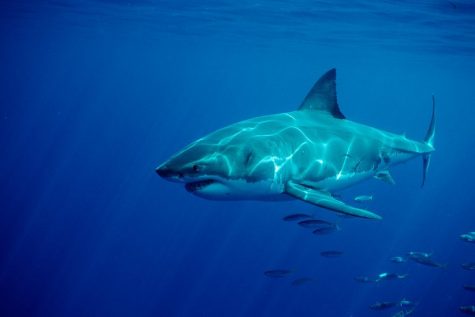Sharks Play a Vital Role
January 25, 2018

The world’s oceans are home to one million discovered species of plants and animals, while some scientists say there may be well over nine million species yet to be discovered. All of those species are part of our ocean’s complex ecosystem, whose quality level heavily relies on several balances. A vital part of the species web is the apex predator, the Shark. One of the most ignored issues our oceans face, is the overfishing and killing of these animals. The majority of people view sharks as scary and violent sea creatures, but their predatorial role is important in not only keeping the ocean’s ecosystem in balance, but the world’s.
Sharks are unique in the case that they do not have a natural predator of their own. A reason for their dominance is accredited to their lengthy existence and evolutionary design. They have been part of the world’s ecosystem for over 450 million years. During this time period, they survived five mass extinctions: Ordovician-Silurian, Late Devonian, Permian, Triassic-Jurassic, and Cretaceous-Tertiary. Each extinction survival evolved a shark’s physical design and enhanced their strategic abilities. Sharks are at the top of the food chain and play a keystone species title, meaning they play a vital, unique, and irreplaceable role in the ocean’s ecosystem balance.
Sharks are responsible for keeping fish species’ food webs in balance. As most predators do, sharks target the weak and old fish to feed on. On one hand, it is a cruel act, but in the other, it results in that specific prey species of fish to remain healthier and disease limited. In conjunction, populations of fish are groomed and kept under control to assure the ecosystem stays in check. Sharks also maintain coral reef and seagrass habitats. Sharks are such intimidating creatures that prey species even shift domains. This keeps prey from developing unhealthy feeding strategies, diets, and prevents them from destroying habitats. For example, a study in Hawaii proved that the absence of tiger sharks in an area caused sea turtles, which are the sharks’ prey, to constantly graze on the most nutritious and best type of seagrass. Due to the overgrazing, these habitats were quickly destroyed. However, when the tiger sharks were present, the turtles spread out and grazed over a wider area, rather than only one region.
Even an apex predator who has undergone millions of years of evolution falls prey to the world’s most dangerous predator- humans. Sharks are hunted for numerous selfish reasons: commercial fishing, sport, jewelry, shark leather, cosmetics, and other health products. A delicacy for several countries around the world is shark fin soup. Fishermen mutilate the sharks by cutting their fins off and simply throwing them back into the water. The animal, still alive, is completely immobilized and will sink to the bottom of the ocean where they either bleed out, suffocate, starve, or undergo a painful death by other fish and predators.
The extinction of sharks would harm the ocean, humans, and the planet as a whole. They play a vital role in the sea’s ecosystem, but they also play an important role in certain economies as well. Several countries largely benefit from shark ecotourism. Tourists are taken out to dive and snorkel with sharks to gain first hand experience with such a misunderstood creature. The imbalance of certain fish will also result in fisheries experiencing economic downturn. One case in North Carolina showed that a decrease in the shark population resulted in the ray population below them to increase. This caused the rays to eat all the bay scallops, and eventually the fishery had to cease business.
If you look at the big picture, the ocean cannot survive without sharks, and we cannot survive without the ocean. Approximately two-thirds of our Earth’s surface is covered by ocean water. Oceans are our only natural defense against global warming since they absorb the most carbon from our atmosphere. The well-being of our ocean and all of the value it provides to our global health, is largely due to the millions of organisms that call it home. Each one serves its purpose to complete the overall picture. The extinction of sharks would cause a large disturbance and potentially change our oceans and life as we know it. Mankind must recognize the value these creatures bring before it’s too late for them and inevitably us.
In conclusion, we need sharks. Movies and shows have demonized this animal, resulting in people to turn their heads, ignore the issue, and become completely oblivious to the consequences humans and the planet will face if sharks become extinct. Studies show that there are approximately 19 shark attacks each year, with only one fatal attack every two years. According to Marine Policy, a published report showed that an estimated 100 million sharks are killed every year. Between humans and sharks, we are the predators.


